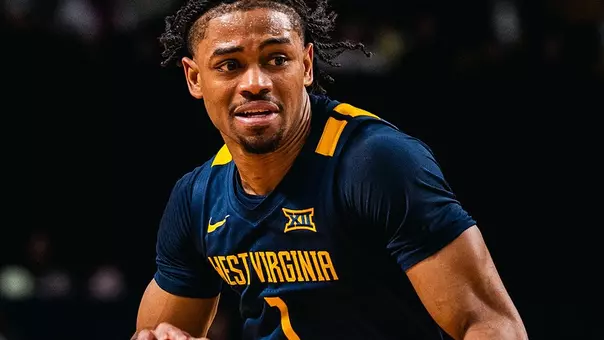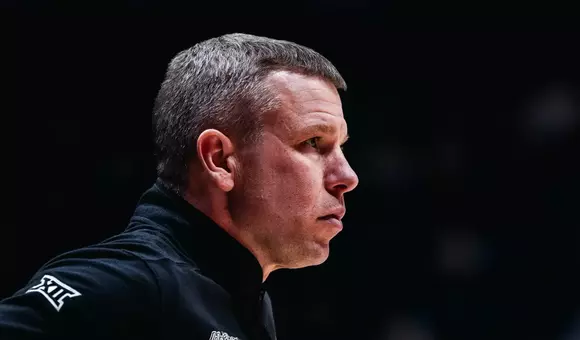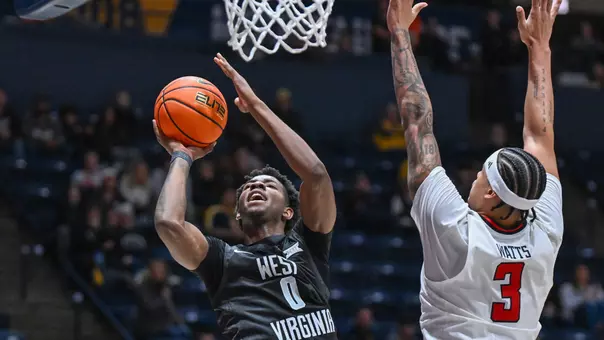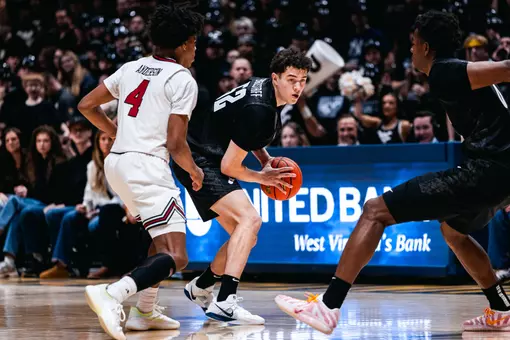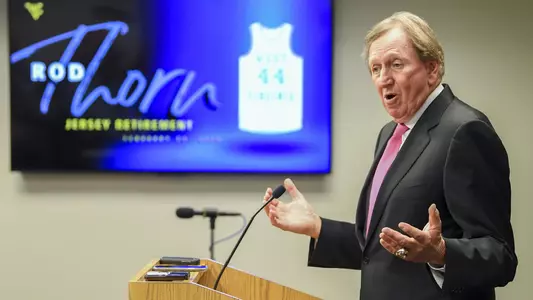
Photo by: All Pro Photography/Dale Sparks
WVU’s Thorn Best Known for Drafting Chicago’s Michael Jordan
April 20, 2020 10:09 AM | Men's Basketball, Blog
The Michael Jordan documentary, "The Last Dance," was the best two hours of sports since the U.S. went into lockdown a month ago.
Episodes 1 and 2 of the 10-part series, which chronicles Michael Jordan and the 1997-98 Chicago Bulls, premiered Sunday evening. Jordan and the Bulls permitted NBA Entertainment to have a behind-the-scenes look at their final championship, their sixth together.
The remaining episodes will air on ESPN and Netflix over the next four Sundays.
West Virginia's Rod Thorn was the man responsible for drafting Michael Jordan to the Bulls in 1984. Jordan was the No. 3 pick in the draft that year behind 7-foot centers Hakeem Olajuwon (Houston Rockets) and Sam Bowie (Portland Trailblazers).
Thorn, whose West Virginia jersey No. 44 was retired before the Oklahoma game on Saturday, Feb. 29, recalled the circumstances behind drafting Jordan.
"About a month before the draft, Stu Inman, who was Portland's general manager at the time and who I was very friendly with, I called him and I said, 'Have you guys decided who you are going to take yet?' He said, 'If Bowie passed the physical, we will take him.' So about a week before the draft I called Stu and asked him if Bowie passed the physical. He said yes and I asked him if he was still going to take him and he said yes.
"So I knew that we were going to get Jordan before the draft, unless some crazy trade came up. Had Portland won the flip they would have taken (Hakeem) Olajuwon and Houston would have taken Michael. So we were very, very fortunate."
If Chicago won the flip and drafted first, Thorn said he would have taken Olajuwon.
"Everything is relative to the time," he said. "Big guys were so much more important than small guys. Anybody who said they wouldn't have taken Olajuwon is not telling the truth because 30 teams would have taken him."
More than 35 years later, Thorn said the NBA game is completely different, thanks to dynamic players like Jordan and those who followed.
"The game has changed with all of the 3-point shooting; the analytics tell you that if you make 32 percent of your 3s that's like making 50 percent of your 2s. Where are the low-post players? (Joel) Embiid and maybe a couple of other guys. That's it. Now it's more outside-in than inside-out," he explained.
"My personal preference is I'd like to see a little more of variance and diversity in play," Thorn continued. "About 15 years ago, everybody was talking about there are no point guards in the NBA. Now, if you don't have a point guard you are dead. About 10 years or so ago, no shooters. Now shooters are everywhere because the AAU programs, the youth programs started emphasizing those things."
The big men have seemingly gone the way of the dinosaurs if they don't possess a perimeter game or aren't quick enough to guard smaller players.
"Small guys could play now that couldn't play before because of the physicality of the game," Thorn said. "Now you can't touch guys up front. Guys who can only shoot can play because they've spread the court and changed the game. It's different. Look at Houston. They start a 6-foot-5 center (P.J. Tucker) and they have a good team. A 6-foot-5 center, that's like crazy."
Thorn said talent was always the No. 1 factor he considered when drafting players. He admitted some of drafting mistakes were the result of valuing pure talent too much.
"I think back to the time I was drafting and virtually every mistake I made in drafting had to do with talent. I always took the talent guy. He may not have been the best guy in the world, but we'll put him in our system and he will be. It doesn't work all of the time," he admitted.
Nevertheless, Thorn pulled three bars when he sent Michael Jordan's name to NBA commissioner David Stern back in 1984.
West Virginians know Rod Thorn as an All-American basketball player for the Mountaineers, Thorn is best-known outside the Mountain State as the guy who drafted the NBA's greatest player.
Thorn said he doesn't mind.
"Thank goodness. That's probably what I'm known more for than anything else. If you are going to be known for something that's not a bad thing to be known by," he laughed.
Episodes 1 and 2 of the 10-part series, which chronicles Michael Jordan and the 1997-98 Chicago Bulls, premiered Sunday evening. Jordan and the Bulls permitted NBA Entertainment to have a behind-the-scenes look at their final championship, their sixth together.
The remaining episodes will air on ESPN and Netflix over the next four Sundays.
West Virginia's Rod Thorn was the man responsible for drafting Michael Jordan to the Bulls in 1984. Jordan was the No. 3 pick in the draft that year behind 7-foot centers Hakeem Olajuwon (Houston Rockets) and Sam Bowie (Portland Trailblazers).
Thorn, whose West Virginia jersey No. 44 was retired before the Oklahoma game on Saturday, Feb. 29, recalled the circumstances behind drafting Jordan.
"About a month before the draft, Stu Inman, who was Portland's general manager at the time and who I was very friendly with, I called him and I said, 'Have you guys decided who you are going to take yet?' He said, 'If Bowie passed the physical, we will take him.' So about a week before the draft I called Stu and asked him if Bowie passed the physical. He said yes and I asked him if he was still going to take him and he said yes.
"So I knew that we were going to get Jordan before the draft, unless some crazy trade came up. Had Portland won the flip they would have taken (Hakeem) Olajuwon and Houston would have taken Michael. So we were very, very fortunate."
If Chicago won the flip and drafted first, Thorn said he would have taken Olajuwon.
"Everything is relative to the time," he said. "Big guys were so much more important than small guys. Anybody who said they wouldn't have taken Olajuwon is not telling the truth because 30 teams would have taken him."
More than 35 years later, Thorn said the NBA game is completely different, thanks to dynamic players like Jordan and those who followed.
"The game has changed with all of the 3-point shooting; the analytics tell you that if you make 32 percent of your 3s that's like making 50 percent of your 2s. Where are the low-post players? (Joel) Embiid and maybe a couple of other guys. That's it. Now it's more outside-in than inside-out," he explained.
"My personal preference is I'd like to see a little more of variance and diversity in play," Thorn continued. "About 15 years ago, everybody was talking about there are no point guards in the NBA. Now, if you don't have a point guard you are dead. About 10 years or so ago, no shooters. Now shooters are everywhere because the AAU programs, the youth programs started emphasizing those things."
The big men have seemingly gone the way of the dinosaurs if they don't possess a perimeter game or aren't quick enough to guard smaller players.
"Small guys could play now that couldn't play before because of the physicality of the game," Thorn said. "Now you can't touch guys up front. Guys who can only shoot can play because they've spread the court and changed the game. It's different. Look at Houston. They start a 6-foot-5 center (P.J. Tucker) and they have a good team. A 6-foot-5 center, that's like crazy."
Thorn said talent was always the No. 1 factor he considered when drafting players. He admitted some of drafting mistakes were the result of valuing pure talent too much.
"I think back to the time I was drafting and virtually every mistake I made in drafting had to do with talent. I always took the talent guy. He may not have been the best guy in the world, but we'll put him in our system and he will be. It doesn't work all of the time," he admitted.
Nevertheless, Thorn pulled three bars when he sent Michael Jordan's name to NBA commissioner David Stern back in 1984.
West Virginians know Rod Thorn as an All-American basketball player for the Mountaineers, Thorn is best-known outside the Mountain State as the guy who drafted the NBA's greatest player.
Thorn said he doesn't mind.
"Thank goodness. That's probably what I'm known more for than anything else. If you are going to be known for something that's not a bad thing to be known by," he laughed.
Steve Sabins | Feb. 16
Monday, February 16
Matthew Graveline | Feb. 16
Monday, February 16
TV Highlights: WVU 74, UCF 67
Sunday, February 15
Ross Hodge | UCF Postgame
Sunday, February 15
